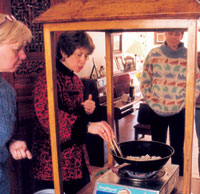| Bridging the Culinary Gap |
| http://www.sina.com.cn 2004/11/24 16:40 thats China |
Eventually, that curiosity also led to opportunity, as her second Chinese teacher told her of a job opening at CCTV for a native English-speaking cooking show host. Her interest in the cuisine already aroused, she applied and got the job, in early 1999. The show made her instantly known to the expat community and started her jour ney into the heart of Chinese food. "I expected the script to be right there for me, but it wasn't like that at all," Clissold recalls. "They would say to me 'Now talk about soy for five minutes.' So I spent a lot of time searching for information." This crash course continued for the year and a half she worked on the show. The experience also brought to her attention a frustrating gap in perception - though Chinese chefs could make wonderful food, they often had trouble understanding what Westerners really wanted to learn and eat. "They had a preconceived concept of what foreigners want to know about Chinese food," says Clissold. "They'd always do the typical restaurant stuff, the most glamorous, most elaborate dishes, whereas my interest was more in things like ingredients, history, why things were put together in certain ways, and how to make a balanced Chinese meal."
Encouraged by friends, she decided to strike out on her own after her work with CCTV had ended and teach what she felt was most important for people to learn - the basics. She enlisted the help of several chefs to help her put together the "Chinese Cooking Book," a compilation of forty common recipes from various regions that would form the basis of her first eight-lesson course. At first the chefs helped with the presentation of the classes. But within a few months, Clissold and her assistant Niu decided they could do it themselves. "Ninety percent of what we cook [in class] is really jia chang cai; it's what people are eating in their homes every day. To a Chinese person it would be like making a cheese sandwich, but to a foreigner it's just a completely new world. So we found we could work very well on our own," says Clissold. Since that first class three years ago Clissold has gone on to offer a wide range of other courses, reflecting her desire to continue to learn new things. She has done special classes on vegetarian food, Chinese food for health, and recently, a course devoted to vegetables most Westerners don't know. "What I really enjoy is showing people vegetables they've never seen before and how they can cook with them," she says. In her courses Clissold goes far beyond a simple demonstration of how to cook the dishes; the first portion of every class is devoted to the history and philosophy of Chinese cuisine. Participants learn about such concepts as the yin and yang of food; the importance of satisfying all the "five tastes" (sweet, sour, salty, pungent and bitter); and the role tofu has played in feeding China's population over the centuries. |
|
|
|
|
|
| Annotation |
| 新闻查询帮助 | |
| 热 点 专 题 | ||||
| ||||
|
教育频道意见反馈留言板 电话:010-62630930-5178 欢迎批评指正
新浪简介 | About Sina | 广告服务 | 联系我们 | 招聘信息 | 网站律师 | SINA English | 会员注册 | 产品答疑
Copyright © 1996 - 2004 SINA Inc. All Rights Reserved
版权所有 新浪网![]() 北京市通信公司提供网络带宽
北京市通信公司提供网络带宽

